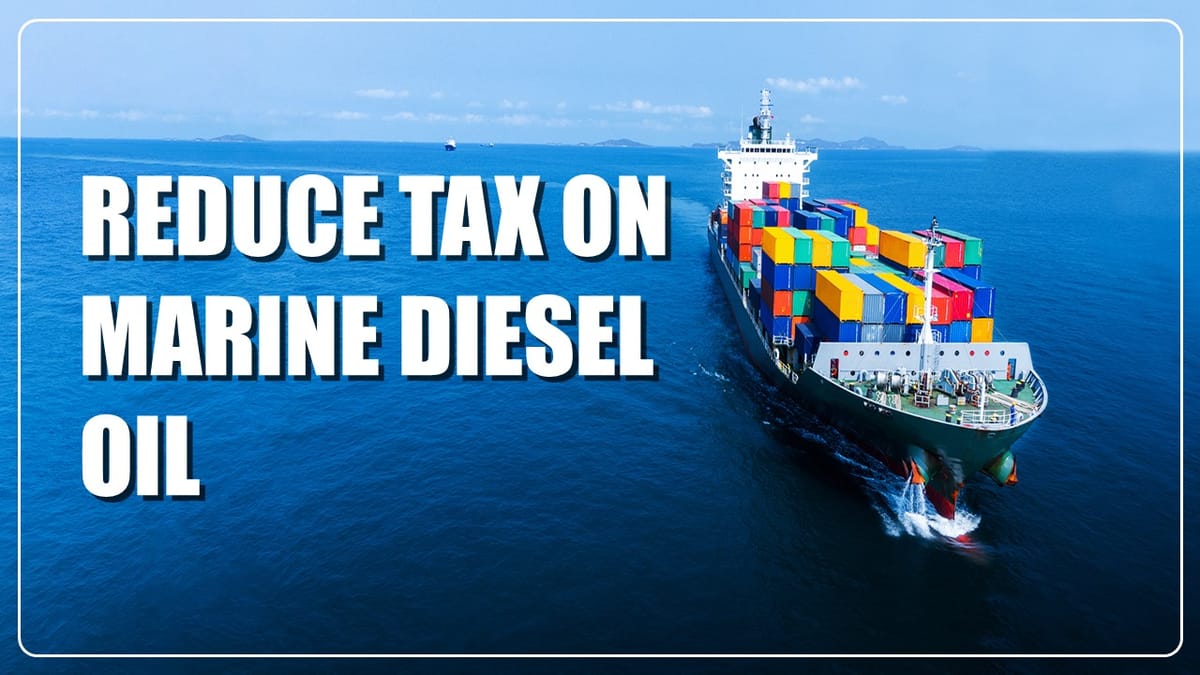The union government is aiming to decrease the tax on marine diesel oil (MDO) by reaching an agreement to bring it under the GST, among other options.
Reetu | Sep 24, 2024 |

Govt plans to Reduce Tax on Marine Diesel Oil to increase Coastal and Inland Shipping
The union government is aiming to decrease the tax on marine diesel oil (MDO) by reaching an agreement to bring it under the Goods and Services Tax (GST), among other options. The goal is to cut prices for coastal and inland shipping, allowing enterprises to become more competitive and attract more cargo to this comparably less polluting form of transportation.
According to three sources familiar with the situation, the Ministry of Ports, Shipping, and Waterways (MOPSW) would request that the Ministry of Finance and States consider lowering taxes and bringing MDO under GST, as well as contemplating extra incentives for the growing sector.
The operation will end up in a minor revenue loss because marine fuel consumption accounts for only approximately 1% of India’s total fuel consumption. Even if states lose some revenue, they could be compensated for it through GST, according to one of the sources quoted above.
India’s demand for petroleum products such as petrol, diesel, liquefied petroleum gas (LPG), aviation turbine fuel (ATF), and naptha is predicted to reach a new high of 238.95 million tonnes this financial year. At this level, the use of marine oil would be approximately 2.4 million tonnes.
Queries submitted to the Ministry of Finance and the Ministry of Ports, Shipping and Waterways were not immediately responded to.
Rakesh Singh, secretary of the ICC Shipping Association, stated, “Reducing taxes on marine diesel oil used by coastal ships and inland waterway vessels would help reduce the high operational costs. Oil costs account for over 40% of coastal shipping’s operational costs, thus any reduction would be a significant benefit to the industry.”
He continued, “The reduction in taxes can easily be achieved by putting MDO under GST for coastal shipping and inland waterways, as 95% of the segment consumes this lighter oil as opposed to the heavy bunkering fuel used by large intercontinental ships. Since late 2017, bunker fuel has been subject to a 5% GST, which applies to foreign-going vessels as well as the movement of container cargo ships along Indian coastal routes.
The GST Council initially recommended a GST rate of 18% for bunker fuel. The GST Council suggested a 5% GST rate on bunker fuel supplied to foreign-going vessels after determining that the high charge was making India less competitive in comparison to nearby countries. The council stated that this GST rate on bunker fuel will stimulate coastal shipping on par with foreign-going boats and eliminate the administrative challenges of monitoring end-use.
Another official in the directorate general of shipping, MoPSW, who did not want to be identified, said the plan to decrease MDO tariffs and bring it under GST was being reviewed, and that his office was gathering data on the volume and type of fuels used by the sector.
The MoPSW has also discussed the issue with states in the Maritime State Development Council. To be approved, the MDO plan must receive state approval at the GST Council meeting.
According to the official quoted above, a proposal to allow all coastal and interior vessels to use bonded bunkers, which are special fuels with cheaper taxes, is also under consideration. He added, the shipping ministry has conducted a thorough investigation into the issue and has raised it with the finance ministry. The finance ministry has requested a few clarifications, and conversations with oil marketing companies are now happening, the person said.
Singh of the ICC Shipping Association stated that case studies from various European countries demonstrate that coastal and inland waterways cannot be expanded without government incentives.
The MoPSW has established a number of schemes to promote and enhance coastal shipping and inland waterways as part of the Sagarmala Programme. About 231 projects worth Rs.14,526 crore have been proposed to assist the move of more cargo from land-based transportation to waterways. Another 25 projects costing Rs.2,906 crore attempt to provide infrastructure for coastal cargo handling.
The shipping ministry’s roll-on, roll-off cum passenger ferry (ROPAX) service aims to reduce travel time, vehicle emissions, and road traffic. The Sagarmala plan has selected approximately 75 projects connected to the construction of ROPAX and passenger jetties, which are now being implemented across the country.
The initiative also includes 38 inland waterways projects worth an estimated Rs.4,899 crore, including the NW16 project, which connects to the Indo-Bangladesh Protocol (IBP) route.
In case of any Doubt regarding Membership you can mail us at [email protected]
Join Studycafe's WhatsApp Group or Telegram Channel for Latest Updates on Government Job, Sarkari Naukri, Private Jobs, Income Tax, GST, Companies Act, Judgements and CA, CS, ICWA, and MUCH MORE!"